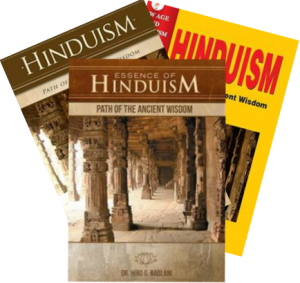The Influence of Hindu Philosophy
on Thinkers throughout the Ages
I found a race of mortals living upon the Earth, but not adhering to it,
Inhabiting cities, but not being fixed to them,
Possessing everything, but possessed by nothing.
Apollonius Tyaneus, first century CE
Greek thinker and traveler
Among all nations, during the course of centuries and throughout the passage of time, India was known as the mine of wisdom and the fountainhead of justice and good government, and the Indians were credited with excellent intellect, exalted ideas, universal maxims, rare inventions, and wonderful talents.
Qadi Sa’id, 1029–1070
Arab Muslim scientist of Cordova, Moorich
It does not behoove us, who were merely savages and barbarians when the Indians and Chinese people were civilized and learned, to dispute their antiquity.
Voltaire, 1694–1778
French author and philosopher
The motion of the stars calculated by the Hindus before some 4500 years vary not even a single minute from the tables we are using today.
[Cassine and Meyer tables used in the nineteenth century]
Jean-Sylvain Bailly, 1736–1793 French astronomer
The Sanskrit language is of wonderful structure, more perfect than the Greek, more copious than the Latin, and more exquisitely refined than either.
Sir William Jones, 1746–1794 British jurist and Indologist
In the whole world, there is no study, except that of the original Vedas, so beneficial and so elevating as that of Upanishads. It has been the solace of my life; it will be the solace of my death. They present the fruit of the highest knowledge and wisdom.
Arthur Schopenhauer, 1788–1860 German philosopher
The Indian teaching teaches to speak truth, love others, and to dispose trifles. The East is grand—and makes Europe appear the land of trifles.
Ralph Waldo Emerson, 1803–1882 American poet and philosopher
In the morning I bathe my intellect in the stupendous and cosmological philosophy of the Bhagavad Gita, in comparison with which our modern world and the literature seem puny and trivial.
Henry David Thoreau, 1817–1862 American poet and philosopher
If I were to look over the whole world to find out the country most richly endowed with all the wealth, power, and beauty that nature can bestow, in some parts a very paradise on earth, I should point to India.
Friedrich Max M. Muller, 1823–1900 Renowned German scholar and Indologist
Tolstoy not only read the Vedas but also spread their teachings in Russia. He included many of the sayings of the Vedas and the Upanishads in his collections.
Alexandra Shifman on Leo Tolstoy, 1828–1910
Russian author and philosopher
India is the cradle of the human race, the birthplace of human speech, the mother of tradition. Our most valuable and most instructive materials in the history of man are treasured up in India only.
Mark Twain, 1835–1910 American author and humorist
The Indian way of life provides the vision of the natural, real way of life. On the face of India are the tender expressions, which carry the Creator’s hand.
George Bernard Shaw, 1856–1950
Irish author and literary critic
If there is one place on the face of earth where all the dreams of living men have found a home, from the earliest days when man began the dream of existence, it is India.
Romain Rolland, 1866–1944
French author
The history of India for many centuries had been happier, less fierce, and more dreamlike than any other history. In these favorable conditions, they built a character—meditative and peaceful and a nation of philosophers such as could nowhere have existed except in India.
- G. Wells, 1866–1946
Sociologist, historian, and author
When I read the Bhagavad Gita and reflect about how God created this universe, everything else appears superfluous.
Albert Einstein, 1879–1955
German scientist and humanist
India was the motherland of our race, and Sanskrit the mother of Europe’s languages; she was the mother of our philosophy; mother, through the Arabs, of much of our mathematics; mother, through the Buddha, of the ideals embodied in Christianity; mother, through the village community, of self-governance and democracy; Mother India is in many ways the mother of us all.
Prof. Will Durant, 1885–1981
American author and historian
It is already becoming clear that a chapter, which had a Western beginning, will have an Indian ending, if it is not to end in the self destruction of the human race
Arnold Joseph Toynbee, 1889–1975
British historian
India conquered and dominated China culturally for twenty centuries without having to send a single soldier across her border.
Hu Shih, 1891–1962
Former Chinese ambassador to the United States
The Bhagavad Gita] is one of the clearest and most comprehensive summaries of the perennial philosophy ever to have been done.
Aldous Huxley, 1894–1963 English novelist
Access to the Vedas is the greatest privilege this century may claim over all previous centuries.
- Robert Oppenheimer, 1904–1967
American nuclear physicist (father of the atom bomb)
About a thousand of their [the Jews’] forefathers fled from Palestine to India after the destruction of the second temple in 135 CE, and were welcomed by the Hindu ruler of the time, who allowed them to settle wherever they pleased. The governing factor in politics was dharma (righteousness), rather than any panth (denomination).
Geoffrey Moorhouse, 1931– Travel author
Says Swami Vivekananda, “Like the gentle dew that falls unseen and unheard, and yet brings into blossom the fairest of roses, has been the contribution of India to the thought of world.”
Adapted from the slide show “Mera Bharat Mahan”
Presented by Indiatimes (www.indiatimes.com)




